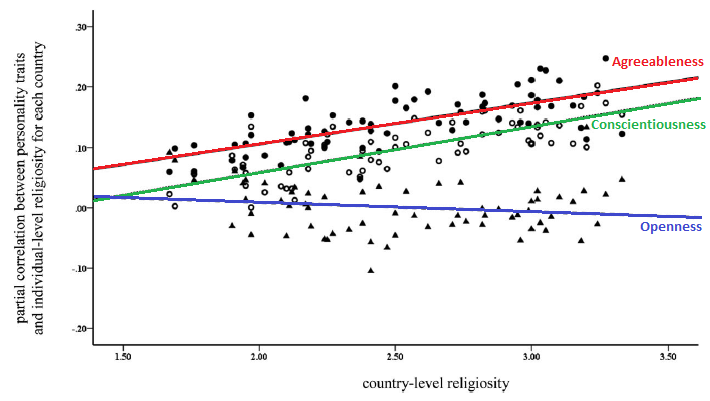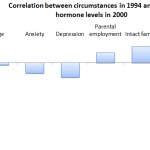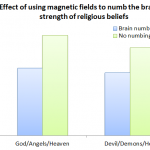There’s a popular model of personality that splits it into five components: openness to experience, conscientiousness, extroversion, agreeableness, and neuroticism. And it’s well known that, while atheists tend to score high on openness, they tend to get low scores on conscientiousness and agreeableness.
Back in 2010, Vincent Saroglou and colleagues assembled data from all the studies published up to that time – a massive pool of 21,715 people across 19 countries. They found that, across all measures of religion, cultural areas, and age groups, people who scored higher on agreeableness and conscientiousness also reported being more religious.
But as I reported at the time, there were some unusual inconsistencies in the data. Religious people in Europe were less agreeable compared with those in America. And, unlike the American religious, religious Europeans were more closed-minded than the non-religious. Perhaps that’s because the kinds of people who take up religion are different in these different cultural contexts.
With the advent of the of massive population surveys made possible to the internet, if#s become possible to check wether that’s the case. Jochen Gebauer (at Humboldt University, Berlin) and colleagues have taken advantage of some of these to run an analysis of over 3 million different people.
Think about that for a moment. Three million people gives not only unprecedented power to unravel correlations, but also means that you don’t have to cobble together studies with different methods different measurements, as Saroglou had to.
They first took data from the Gosling-Potter Internet Personality Project, which has over 2 million people on file from around the world. They split this into two, to compare different countries and also different states within the USA. Then they looked at nearly 400,000 Britons in 121 different urban areas. The last sample was a smaller one of nearly 15,000 people across 15 German states.
Overall, they did find that Agreeableness and Conscientiousness were the two strongest predictors of personal religiosity. Confirming what Saroglou found, this relationship was stronger in the more religious populations in the Gosling-Potter Internet Personality Project.
But these data let them go further and look at how the strength of relationship between each personality factor and religiousness varied according to how religious was the country, state, or town the person was living in.
Take a look at the graphic, which shows how the relationship varies internationally.
 What this shows is that, in more religious countries (towards the right of the graph), the strength of the relationship between agreeableness or conscientiousness and religion is stronger. But the relationship with openness is weaker!
What this shows is that, in more religious countries (towards the right of the graph), the strength of the relationship between agreeableness or conscientiousness and religion is stronger. But the relationship with openness is weaker!
They found essentially the same result in all the samples they looked at. It seems to be a universal result whether comparing at countries, states or towns. And whether you look at more religious USA or less religious Europe.
They also got similar results when they looked at friends’ and acquaintances assessments of the subjects personality. And, in yet another dataset, they found that personality predictions of religiosity two years later showed a similar relationship – once driven by how religious the society was that the person lived in.
So this is why atheists in the USA are disagreeable and unconscientious. It’s because the USA is a pretty religious country.
If you think about it, that makes sense. If you’re going to be an atheist in a religious country, you need to be the sort of person who’s willing to disagree and argue. And you’re not likely to be the kind of person who dutifully traipes along to Church every Sunday, like a good citizen.
On the other hand, you are going to be the kind of person who is open to new experiences. In a less religious country, where atheists are more common, you begin to find that it is th religious people who are most open to new experiences!
In other words, atheists in the USA are trailblazers, willing to take on new perspectives and stand out from the crowd. And maybe just a bit difficult with it.
![]() Gebauer, J., Bleidorn, W., Gosling, S., Rentfrow, P., Lamb, M., & Potter, J. (2014). Cross-cultural variations in Big Five relationships with religiosity: A sociocultural motives perspective. Journal of Personality and Social Psychology, 107 (6), 1064-1091 DOI: 10.1037/a0037683
Gebauer, J., Bleidorn, W., Gosling, S., Rentfrow, P., Lamb, M., & Potter, J. (2014). Cross-cultural variations in Big Five relationships with religiosity: A sociocultural motives perspective. Journal of Personality and Social Psychology, 107 (6), 1064-1091 DOI: 10.1037/a0037683
 This article by Tom Rees was first published on Epiphenom. It is licensed under Creative Commons.
This article by Tom Rees was first published on Epiphenom. It is licensed under Creative Commons.














